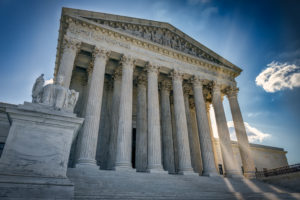The Equal Rights Amendment—Long Gone or Here To Stay?
Answer May Depend on Politicized Justice Department
Recently, the question of ratification of the Equal Rights Amendment (ERA) emerged once again during Senate confirmation hearings for a new Archivist of the United States, the person in charge of the National Archives and Records Administration (NARA). Colleen Shogan, Ph.D., is President Joe Biden’s pick to lead NARA. She previously worked in the U.S. Senate and the Library of Congress, and she has held various positions on boards and commissions related to American History. She faced rigorous questioning from Sens. Rob Portman (R-Ohio) and James Lankford (R-Oklahoma) about her stance on whether NARA could certify the ERA.
What is the ERA, exactly, and why would it be unlawful to certify it? The misnamed resolution purports to ensure that women are equal in the U.S. Constitution. But in reality, the amendment could have a reverse effect on women’s progress. During a 2019 House Judiciary Committee hearing, for instance, Rep. Mike Johnson (R-Louisiana) exposed that—as written—the ERA can be used to enshrine subjective gender identity classifications and abortion protections into the U.S. Constitution.
The ERA also suffers procedural defects. When the ERA passed Congress in 1972, it included a seven-year deadline for ratification. With the deadline fast approaching, CWA’s founder, Beverly LaHaye, held the first CWA meeting in 1978 to share with women in her community the dangers of the ERA and the anti-God, anti-family rhetoric of the ERA’s supporters. Mrs. LaHaye’s goal was to make sure her friends knew how important it was that the ERA stay out of the Constitution. Thanks to her actions and the leadership of others like Phyllis Schlafly, the ERA was three states short of ratification by its 1978 deadline. Congress voted to extend the deadline to 1982. But even by that time, no new states ratified the ERA.
The ERA is dead. There are measures to retroactively “remove” the 1978 ratification deadline on the ERA, like H.J. Res. 17/S.J. Res. 1. But even according to the Washington Post, a news outlet sympathetic to leftist causes, “every time the issue has been litigated in federal court, most recently in 2021, the pro-ERA side has lost, no matter whether the judge was appointed by a Democrat or Republican.” Under the Trump Administration, the U.S. Department of Justice issued an opinion stating “that Congress had the constitutional authority to impose a deadline on the ratification of the ERA and, because that deadline has expired, the ERA Resolution is no longer pending before the States.” A federal trial court with a judge appointed by President Barack Obama upheld the deadline contained in the 1972 resolution and said that Illinois, Nevada, and Virginia’s ratifications—which came after both the original and extended deadlines that Congress attached to the ERA—are not binding for the purposes of the recognizing the ERA.
The Archivist has a unique role in stewarding the rule of law. In addition to preserving the U.S. Constitution and other Founding documents, the Archivist certifies constitutional amendments that states have ratified. The ERA’s procedural defects doom efforts to amend the Constitution using the 1972 resolution. Pro-ERA activists have urged current Archivist David Ferriero to unlawfully certify ratification of the ERA. In response, the Archivist pointed to his “ministerial role” and said that he “defers to [the Justice Department] on this issue and will abide by the [Justice Department] opinion, unless otherwise directed by a final court order.” During her hearing, Dr. Shogan essentially took the same position.
So what is the problem? The approach to defer to the Justice Department is unstable. Principled constitutional lawyers at the U.S. Department of Justice under the previous administration recognized that there was no constitutional basis to ratify the ERA. The Archivist abided by this counsel from the Justice Department, and ERA ratification was put on hold. Unfortunately, with the Biden Justice Department, we are facing a situation where the leftist fox is guarding the constitutional-hen house. This very Justice Department is comfortable recognizing the ability of the Veterans Affairs to provide abortions and abortion counseling to veterans even though federal law explicitly writes out abortion from healthcare benefits for veterans. The ERA analysis from the previous administration’s Justice Department is vulnerable to an activist “reinterpretation” by the attorneys in power under the radical Biden Administration.
Fortunately, there are Members in Congress who are willing to press the matter. Sen. Lankford has already urged Archivist Ferriero to withstand “ridiculous calls to ignore clear guidance from both the court and the Department of Justice and to unilaterally certify the ERA.” Similarly, Sens. Portman, Ron Johnson (R-Wisconsin), and Mitt Romney (R-Utah) have pressed Archivist Ferriero to stand by the rule of law.
Any pro-ERA attorneys at the Justice Department should heed Justice Ruth Bader Ginsburg’s counsel that ERA supporters should start over. Even she did not think that the ERA could be ratified under its 1972 mandate. If the Justice Department were to unlawfully “reinterpret” its understanding of the Constitution in this regard, the Archivist must stand for the rule of law. That is why we must stay engaged on this nomination.





